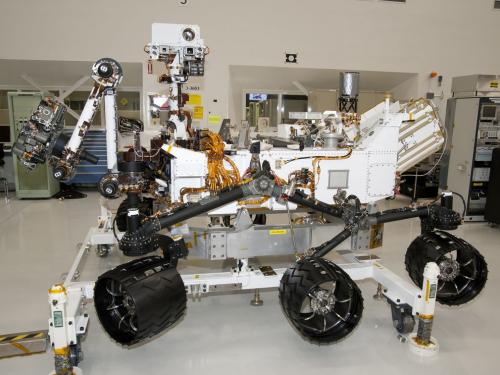
Stories of daring, stories of technological feats, stories of prevailing against the odds ... these are the stories we tell at the National Air and Space Museum. Dive in to the stories below to discover, learn, and be inspired.
Showing 131 - 140 of 145

May 11, 2012
If you visit the Public Observatory during its daytime hours in May (1–3pm on Wednesday through Saturday, weather permitting), you can use the 16” telescope to observe an object which looks a lot like the Moon. Hanging in a blue sky, it shines with yellowish reflected sunlight.

March 07, 2012
We are all familiar with the climate on Earth: the seasons, the range of surface temperatures that are just right for being a water world, the oxygen we breathe, the ozone layer that protects us from UV radiation. In short: habitable. So what other bodies in the Solar System might be (or might have been) habitable, and why aren’t they today? Mars probably comes to mind, and for good reason. Mars has the most similar climate to our own, with water ice caps at the poles, seasonal snow, and dust storms. This is because Mars has a similar axial tilt as the Earth, which creates similar seasonal temperature variations.

November 16, 2011
If all goes according to plan, on November 25th the Mars Science Laboratory (MSL) rover Curiosity will leave the Earth and begin its journey to Mars. Any delays due to weather or other factors should be accommodated by a launch window that extends until December 18th. The spacecraft will use a new landing system to arrive at its landing site on Mars in August, 2012, and the rover carries an impressive array of scientific instruments.

October 06, 2011
The remarkable twin Voyager spacecraft continue to explore the outer reaches of the solar system decades after they completed their surveys of the Outer Planets.

July 22, 2011
Here is a riddle: What takes more than 60 locations, 5 years, and 150 scientists to decide? The landing site for the Mars Science Laboratory (MSL) rover Curiosity. Picking the landing site for a spacecraft to land on another planet is always serious business. And the job of finding the best location for Curiosity to set down on Mars was no exception. Curiosity’s mission is geared towards understanding whether Mars could have ever been habitable.

July 03, 2011
There is a strange looking car parked in the west end of the National Air and Space Museum in downtown Washington, DC. For now, it is only visible behind its security screen from the second floor landing above. From that vantage, the vehicle’s six wheels, robotic arm, mast, and other protrusions are clearly visible. But since this is the Air and Space Museum, it must be more than just a normal car. Soon the barriers will be gone and the public will be able to view the vehicle up close and personal. And what they will see is a model of the next Mars rover, NASA’s 2011 Mars Science Laboratory. The rover, dubbed “Curiosity” will be launched to Mars later this year and will begin its mission to explore whether places on the Red Planet were ever habitable.

June 17, 2011
For the month of June, 30 beautiful images of the solar system are on display on the terrace by the Independence Avenue entrance. They are part of the From Earth to the Solar System exhibition developed by the Smithsonian Astrophysical Observatory/Chandra with the NASA Astrobiology Institute.

April 03, 2011
On Saturday, March 19, I was thrilled to participate in the first ever Sun-Earth Day Tweetup organized by the NASA Goddard Spaceflight Center. It was also the first time the Smithsonian officially participated in a Tweetup. The event was a great opportunity to give twitter fans (aka “tweeps”) some face-to-face interaction with our research scientists, curators and educators, and provide some fun hands-on learning that illustrated the Sun-Earth connection.

March 18, 2011
On March 18, 2011, at 8:45 pm EDT, MESSENGER became the first spacecraft ever to enter Mercury's orbit. In this blog, Tom Watters reflects on the importance of this achievement.

July 14, 2010
The staff at the National Air and Space Museum are gearing up for the annual Mars Day!, a celebration of the Red Planet. On July 16 from 10 a.m. to 3 p.m., visitors at the Museum can partake of a variety of educational and family fun activities throughout the galleries.
